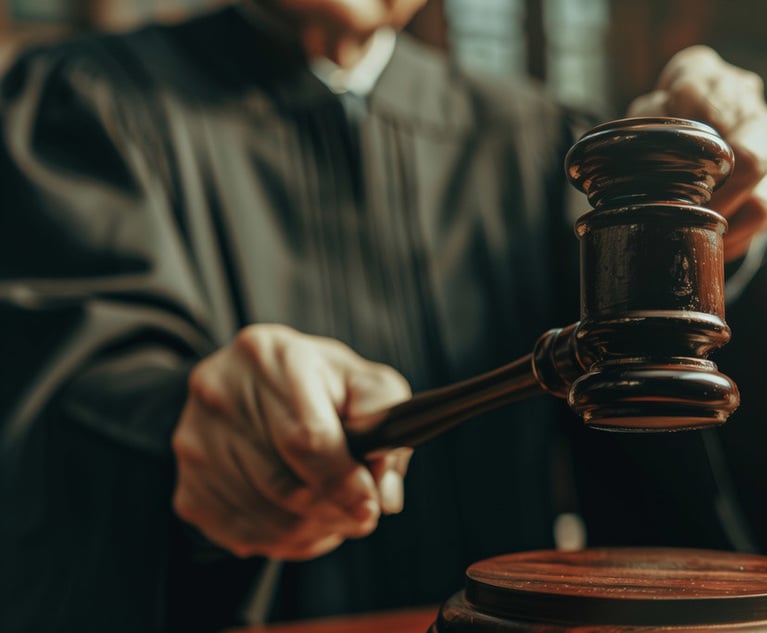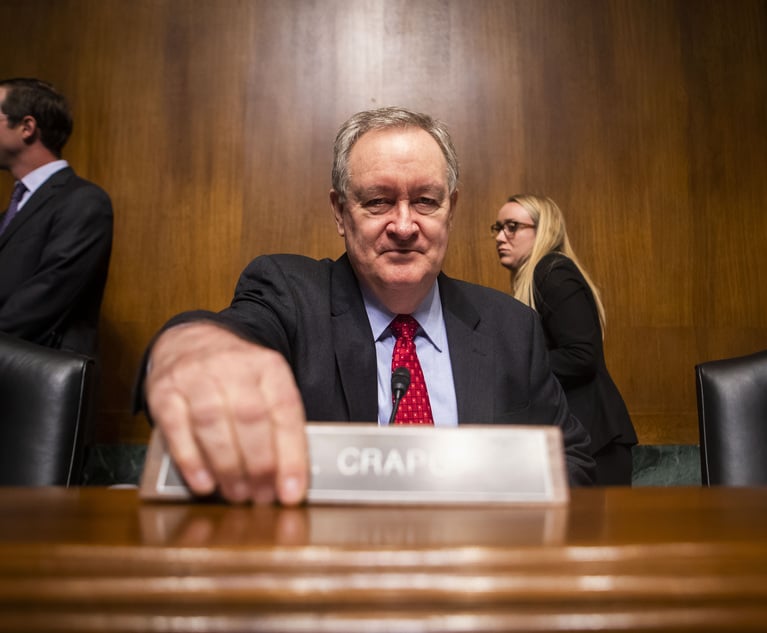House Panel Weighs Transparency, Privacy in Exploring Court Reforms
One of the reforms raised by transparency advocates would require posting the financial disclosure statements of judges and justices online.
June 21, 2019 at 06:53 PM
4 minute read
 Congressman Jerrod Nadler (D-NY) chairs a House Judiciary Committee Department of Justice Oversight hearing in February. Photo: Diego M. Radzinschi /ALM
Congressman Jerrod Nadler (D-NY) chairs a House Judiciary Committee Department of Justice Oversight hearing in February. Photo: Diego M. Radzinschi /ALM
Members of Congress on Friday explored ways to increase transparency and accountability of the federal judiciary, though some voiced concern that reforms could jeopardize the security of judges and the unique status of Supreme Court justices.
“As both branches consider how to ensure that the judicial branch keeps pace with our evolving standards for transparency and accountability in a modern democracy, we must be mindful of the safety of our judges and the women and men who assist the courts in fulfilling their responsibilities,” House Judiciary Committee chairman Jerrold Nadler, D-New York, said in a statement.
Nadler spoke at a hearing on “The Federal Judiciary in the 21st Century: Ideas for Promoting Ethics, Accountability, and Transparency” before the Subcommittee on Courts, Intellectual Property and the Internet.
One of the reforms raised by transparency advocates would require posting the financial disclosure statements of judges and justices online. They are currently released to journalists and others who make written requests. But ranking Republican committee member Martha Roby, R-Alabama, said that “with the high profile and sometimes contentious decisions that judges must make, there are unique safety and security concerns.”
One of the witnesses before the committee, Indiana University Maurer School of Law Charles Geyh, said privacy concerns could be alleviated if the financial disclosures black out any information that could breach a judge's privacy—a procedure the Administrative Office of the U.S. Courts already performs.
“In other words, this is a redaction problem. Redact all information that threatens the privacy of judges and safety of judges,” Geyh said.
Other witnesses before the House committee discussed whether justices should be required to explain why they recuse themselves in cases. Some also urged the development by the court itself of an ethics code for Supreme Court justices, who don't currently have one. The justices, however, say they voluntarily abide by the code that covers trial and appellate federal judges.
“The impartiality of our judiciary should be beyond reproach, so having a basic ethics code for its members to follow is a natural outgrowth of that common value—one that should be no less rigorously applied to our nation's highest court,” said Gabe Roth, executive director of the advocacy group Fix the Court.
 Justices Elena Kagan, left, and Samuel Alito, right, arrive Thursday to testify in the U.S. House about the U.S. Supreme Court's budget. Photo: Diego M. Radzinschi/NLJ
Justices Elena Kagan, left, and Samuel Alito, right, arrive Thursday to testify in the U.S. House about the U.S. Supreme Court's budget. Photo: Diego M. Radzinschi/NLJJustice Elena Kagan recently said Chief Justice John Roberts Jr. is considering promulgating an ethics code for the Supreme Court. But in his 2011 annual report, Roberts said the court has “never addressed” whether Congress could impose ethical standards on the Supreme Court
Roby said that requiring a code of conduct for the Supreme Court may be unconstitutional. “I also understand that Chief Justice Roberts is working on a code of conduct for Supreme Court Justices and would like to learn more about the progress that has been made in that effort,” she said.
Amanda Frost, professor at American University Washington College of Law, asserted that “in light of the scope of the justices' power and their role at the head of the federal judiciary, it is anomalous that they alone are free from the ethical constraints that govern the rest of the federal judiciary.”
Frost added: “When the justices on the nation's highest court are free from ethical limits and oversight, that omission undermines the public's faith in the federal courts.”
Read more:
Gorsuch Snags $225K Advance for New Book, Roberts' Stocks & More: Disclosures
'We Are Doing Better' Now on Minority Law Clerk Hiring, Kagan Says
This content has been archived. It is available through our partners, LexisNexis® and Bloomberg Law.
To view this content, please continue to their sites.
Not a Lexis Subscriber?
Subscribe Now
Not a Bloomberg Law Subscriber?
Subscribe Now
NOT FOR REPRINT
© 2025 ALM Global, LLC, All Rights Reserved. Request academic re-use from www.copyright.com. All other uses, submit a request to [email protected]. For more information visit Asset & Logo Licensing.
You Might Like
View All
Who Are the Judges Assigned to Challenges to Trump’s Birthright Citizenship Order?

Senator Plans to Reintroduce Bill to Split 9th Circuit

'If the Job Is Better, You Get Better': Chief District Judge Discusses Overcoming Negative Perceptions

Fight Over Amicus-Funding Disclosure Surfaces in Google Play Appeal
Trending Stories
Who Got The Work
J. Brugh Lower of Gibbons has entered an appearance for industrial equipment supplier Devco Corporation in a pending trademark infringement lawsuit. The suit, accusing the defendant of selling knock-off Graco products, was filed Dec. 18 in New Jersey District Court by Rivkin Radler on behalf of Graco Inc. and Graco Minnesota. The case, assigned to U.S. District Judge Zahid N. Quraishi, is 3:24-cv-11294, Graco Inc. et al v. Devco Corporation.
Who Got The Work
Rebecca Maller-Stein and Kent A. Yalowitz of Arnold & Porter Kaye Scholer have entered their appearances for Hanaco Venture Capital and its executives, Lior Prosor and David Frankel, in a pending securities lawsuit. The action, filed on Dec. 24 in New York Southern District Court by Zell, Aron & Co. on behalf of Goldeneye Advisors, accuses the defendants of negligently and fraudulently managing the plaintiff's $1 million investment. The case, assigned to U.S. District Judge Vernon S. Broderick, is 1:24-cv-09918, Goldeneye Advisors, LLC v. Hanaco Venture Capital, Ltd. et al.
Who Got The Work
Attorneys from A&O Shearman has stepped in as defense counsel for Toronto-Dominion Bank and other defendants in a pending securities class action. The suit, filed Dec. 11 in New York Southern District Court by Bleichmar Fonti & Auld, accuses the defendants of concealing the bank's 'pervasive' deficiencies in regards to its compliance with the Bank Secrecy Act and the quality of its anti-money laundering controls. The case, assigned to U.S. District Judge Arun Subramanian, is 1:24-cv-09445, Gonzalez v. The Toronto-Dominion Bank et al.
Who Got The Work
Crown Castle International, a Pennsylvania company providing shared communications infrastructure, has turned to Luke D. Wolf of Gordon Rees Scully Mansukhani to fend off a pending breach-of-contract lawsuit. The court action, filed Nov. 25 in Michigan Eastern District Court by Hooper Hathaway PC on behalf of The Town Residences LLC, accuses Crown Castle of failing to transfer approximately $30,000 in utility payments from T-Mobile in breach of a roof-top lease and assignment agreement. The case, assigned to U.S. District Judge Susan K. Declercq, is 2:24-cv-13131, The Town Residences LLC v. T-Mobile US, Inc. et al.
Who Got The Work
Wilfred P. Coronato and Daniel M. Schwartz of McCarter & English have stepped in as defense counsel to Electrolux Home Products Inc. in a pending product liability lawsuit. The court action, filed Nov. 26 in New York Eastern District Court by Poulos Lopiccolo PC and Nagel Rice LLP on behalf of David Stern, alleges that the defendant's refrigerators’ drawers and shelving repeatedly break and fall apart within months after purchase. The case, assigned to U.S. District Judge Joan M. Azrack, is 2:24-cv-08204, Stern v. Electrolux Home Products, Inc.
Featured Firms
Law Offices of Gary Martin Hays & Associates, P.C.
(470) 294-1674
Law Offices of Mark E. Salomone
(857) 444-6468
Smith & Hassler
(713) 739-1250








